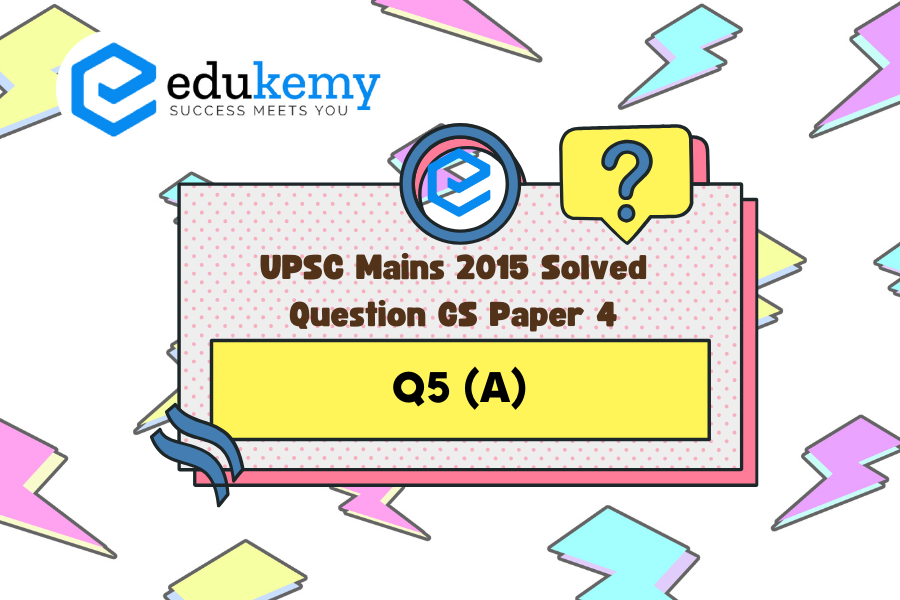The Union Public Service Commission (UPSC) is the apex recruiting body in India responsible for selecting candidates for various prestigious civil services positions. In 2015, the General Studies Paper 4, also known as the Ethics, Integrity, and Aptitude paper, presented candidates with a challenging array of questions aimed at evaluating their ethical and moral reasoning, decision-making abilities, and overall aptitude. This paper, a critical component of the UPSC examination, tests not only the knowledge but also the character and judgment of aspiring civil servants. Let’s delve into the solved questions of the UPSC 2015 GS 4 paper to gain insight into the rigorous standards expected of future administrators and leaders in India.
Contents
- 1 Q5. Two different kinds of attitudes exhibited by public servants towards their work have been identified as the bureaucratic attitude and the democratic attitude. (150 Words, 10 Marks)
- 2 (a) Distinguish between these two terms and write their merits and demerits.
- 3 Decoding the Question:
- 4 Answer:
- 5 In case you still have your doubts, contact us on 9811333901.
Q5. Two different kinds of attitudes exhibited by public servants towards their work have been identified as the bureaucratic attitude and the democratic attitude. (150 Words, 10 Marks)
(a) Distinguish between these two terms and write their merits and demerits.
Tags: Public/Civil service values and Ethics in Public administration: Status and problems; ethical concerns and dilemmas in government and private institutions; laws, rules, regulations and conscience as sources of ethical guidance; accountability and ethical governance; strengthening of ethical and moral values in governance; ethical issues in international relations and funding; corporate governance.
Decoding the Question:
- In the Intro, try to introduce the different kinds of Attitudes exhibited by public servants in their work scenario.
- In Body,
- Give the merits and demerits of these Attitudes.
- In Conclusion, try to give ways to balance these attitudes for the maximum work output.
Answer:
The democratic attitude refers to the approach of an individual to treat everyone equally and not display any discrimination. Democratic attitude includes treating every person with respect; everybody has the opportunity to be heard and understood.
A bureaucratic attitude is characterized by a focus on rules and processes rather than goals (because elaborate and multiple rules make the achievement of goals difficult, if not impossible). Also, it is based on strict adherence to the rules and the hierarchy of the institution.
Merits of Democratic Attitude:
- It ensures participation of people in governance.
- It allows for the flexibility in programme designing and implementation.
- It improves the effectiveness of public service delivery as it is according to the ‘felt needs’ of the people.
Demerits of Democratic Attitude:
- It can be time consuming, as it involves wider consultation.
- It slows down the decision making process.
- It becomes difficult to arrive at a wide consensus on certain issues.
Merits of Bureaucratic Attitude:
- Strict compliance of standard operating procedure.
- Since consultation with the public is not needed, decision making is quick.
- It is easier to fix responsibility for decisions because of the hierarchical decision making process.
Demerits of Bureaucratic Attitude:
- Red-tapism leading to delayed outcomes.
- Apathy towards common people.
- Rigidity renders public service delivery ineffective.
- Status-quoist system, leading to stagnation.
Bureaucratic attitudes reflect hierarchical discipline, implicit obedience to orders, top down instructions, and rule bound approaches and Democratic attitude rests on participatory, humanistic and flexible approaches and on bottom-up decision-making.
In case you still have your doubts, contact us on 9811333901.
For UPSC Prelims Resources, Click here
For Daily Updates and Study Material:
Join our Telegram Channel – Edukemy for IAS
- 1. Learn through Videos – here
- 2. Be Exam Ready by Practicing Daily MCQs – here
- 3. Daily Newsletter – Get all your Current Affairs Covered – here
- 4. Mains Answer Writing Practice – here


